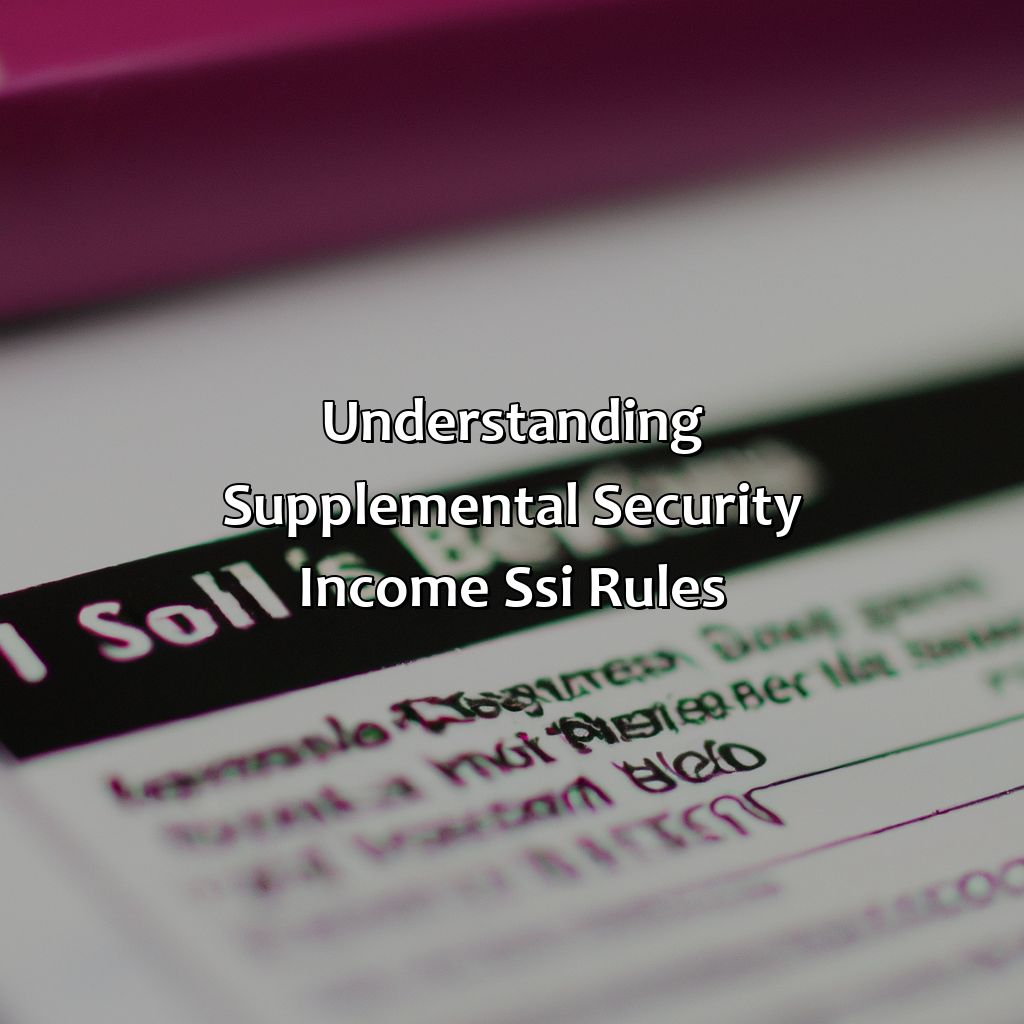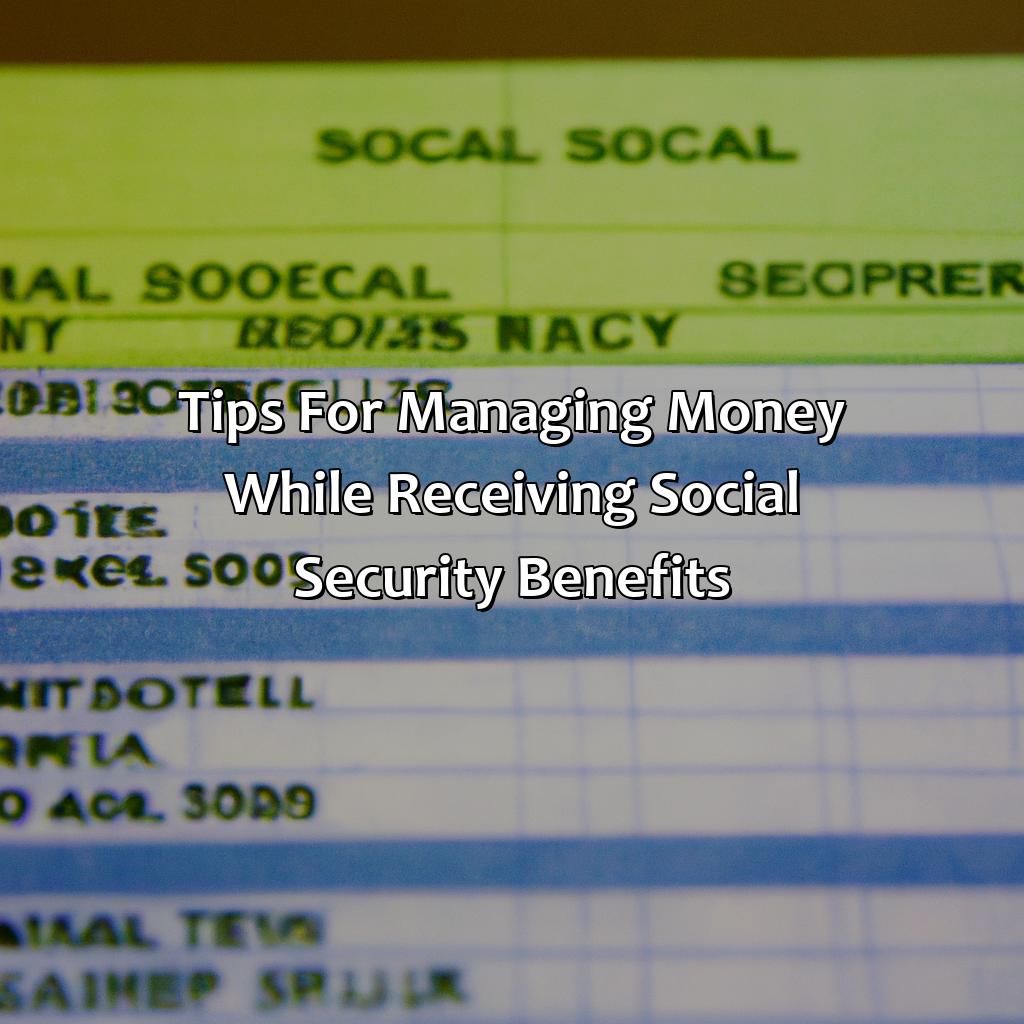How Much Money Can You Have In Your Bank Account If You Are On Social Security?
##Key Takeaway:
Key Takeaway:
- Social Security Benefits are not affected by bank account ownership, but recipients must meet the eligibility and gross income limits to receive benefits.
- SSI recipients must not exceed income and asset limits to receive benefits. Some assets are exempt, but bank account balance is a countable resource for SSI eligibility.
- Managing your money while receiving Social Security Benefits involves budgeting, seeking professional financial advice, and maintaining accurate financial records to ensure eligibility and avoid penalties.
Are you worried about how much money you can keep in your bank account if you are on social security? You don’t have to be! This blog will provide you with all the information you need to make the best decision for your financial future.
Social Security Benefits and Bank Account Ownership
Curious how having a bank account impacts your Social Security benefits? Read this section! Find out the gross income and bank balance limits for Social Security benefits eligibility. Plus, explore the subsections: “Eligibility for Social Security Benefits and Bank Account Ownership” and “Bank Account Balance Limits for Social Security Benefits Eligibility“.

Image credits: retiregenz.com by Yuval Washington
Eligibility for Social Security Benefits and Bank Account Ownership
Social Security Benefits can be granted to individuals who meet specific criteria, including age, disability or other qualifying events. Bank account ownership does not disqualify someone from receiving Social Security benefits, but the amount of money held in the account may have an impact on eligibility. The Social Security Administration has established limits on how much an individual can have in their bank account while still maintaining eligibility for benefits. This limit varies based on the type of benefit being received and other factors. It is important to understand these limitations to avoid potential loss of benefits.
Individuals who receive SSI (Supplemental Security Income) are subject to strict eligibility requirements and restrictions on assets. As of 2021, the maximum amount an individual can have in their bank account is $2,000 for singles and $3,000 for couples. Exceeding these limits can result in reduction or complete loss of benefits. For those receiving SSDI (Social Security Disability Insurance), there are no asset limits, but income thresholds must be met to continue receiving benefits.
It is important to note that owning a joint bank account with someone who is not eligible for Social Security benefits can impact eligibility for SSI recipients due to shared resources rules. Additionally, transfers or gifts of assets above certain thresholds could result in a penalty period where benefits are suspended.
Pro Tip: Be aware of the asset and income limitations associated with receipt of Social Security Benefits before opening a bank account or making large purchases or gifts that could affect your eligibility status. Your income may be gross, but there are limits to how much you can earn and still qualify for social security benefits.
Gross Income Limits for Social Security Benefits
For those receiving Social Security Benefits, there are certain limitations on the gross income you can have. These limitations determine how much money you can have in your bank account while still receiving benefits.
Below is a table that illustrates the Gross Income Limits for Social Security Benefits:
| Filing Status | Gross Income Limit |
|---|---|
| Single, under age 65 | $18,960 |
| Single, age 65 or older | $50,520 |
| Married filing jointly, both spouses under age 65 | $37,920 |
| Married filing jointly, one spouse under age 65 and one age 65 or older | $44,880 |
| Married filing jointly, both spouses age 65 or older | $53,760 |
It is important to note that not all types of income count towards these limits. Some examples of income that are not counted include: Supplemental Security Income (SSI), Veterans Affairs benefits, and stimulus payments related to COVID-19.
If your gross income exceeds these limits even by a small amount, you may lose some or all of your Social Security Benefits. To avoid this situation and ensure you receive the maximum possible benefits, it is important to be mindful of these limits when managing your finances. Take advantage of legal financial options such as trusts and savings accounts to keep your assets secure while maintaining eligibility for Social Security Benefits.
Don’t break the bank, or you might break your eligibility for social security benefits.
Bank Account Balance Limits for Social Security Benefits Eligibility
For individuals receiving social security benefits, there are limits to how much money they can have in their bank account. Here is a breakdown of the bank account balance limits for social security benefits eligibility:
| Scenario | Bank Account Balance Limit |
|---|---|
| Individuals applying for SSI | $2,000 or less at any given time during the month |
| Married couples applying for SSI | $3,000 or less at any given time during the month |
| Individuals receiving SSDI or retirement benefits | No limit to their bank account balance |
It’s important to note that these limits only apply to liquid assets in a bank account and not to other assets like properties or investments. Understanding these limits is crucial for maintaining eligibility and avoiding penalties.
Aside from the bank account balance limits, it’s also worth noting that certain types of income may affect social security benefits. For example, earned income can lead to a reduction in SSI benefits, while unearned income will not affect SSDI or retirement benefits.
In the past, these regulations have been subject to change based on government policies and economic conditions. It’s important for individuals receiving social security benefits to stay up-to-date on any updates or changes that may impact their eligibility.
SSI rules are like a game of Jenga, one wrong move and your benefits could come tumbling down.
Understanding Supplemental Security Income (SSI) Rules
For effective management of your finances, it’s key to understand SSI rules and its income and asset limitations. Be aware of exempt assets and countable resources too! Get the solution you need regarding:
- Income and asset limits for SSI recipients.
- Exempt assets from SSI eligibility rules.
- Countable resources and SSI benefits.
And receive your benefits without interruption.

Image credits: retiregenz.com by Joel Woodhock
Income and Asset Limits for SSI Recipients
For SSI recipients, there are specific rules and regulations regarding the limits on their income and assets. These guidelines are imperative to be followed for receiving the benefits they need.
The table below shows the Income and Asset Limits for SSI Recipients:
| Income | Limits |
|---|---|
| Individual | $794 per month |
| Couple | $1,191 per month |
| Assets | Limits |
|---|---|
| Individual | $2,000 or less |
| Couple | $3,000 or less |
It’s crucial to note that these amounts are subject to change annually due to inflation, which is adjusted accordingly.
The SSI program also evaluates resources that a person may have access to, such as property they own or money in trust. Any exclusions must be reported during an application review.
According to a reliable source from SSA.gov, as of January 2021, the maximum federal SSI payment amount is $794 per month for an individual and $1,191 per month for a couple residing together. These limitations and criteria assist people with low income levels seeking financial support in their day-to-day life.
Don’t go hiding your yacht in grandma’s backyard just yet- there are certain assets that won’t affect your eligibility for SSI.
Exempt Assets from SSI Eligibility Rules
When applying for SSI, some assets may not count towards the eligibility rules. These are called “exempt resources.” Such exempt assets can include one’s primary home, personal items like household goods and clothing, and a single vehicle. However, it is essential to note that rules vary based on an individual’s living situation.
Additionally, certain financial accounts could be considered exempt from the SSI eligibility rules. For instance, if one has Set Aside or Trust funds designated to be used for specific purposes such as medical expenses or education, these will not count towards the resource limit imposed by SSI regulations.
On the other hand, investment accounts such as stocks, bonds or mutual funds cannot be exempted unless they have been earmarked individually for reasons outlined in regulation. In most cases, counting these non-exempt resources along with any cash in hand will result in income being summarily reduced.
Considering you must apply or reapply every year to continue receiving benefits, keeping track of which resources may become (or no longer qualify as) exempt can become crucial. It’s best to consult with an attorney experienced in disability law and asset management for advice on how to maximize your federally funded benefits solely for your use only.
For instance: Anna’s mother left behind a special needs trust fund to provide her with continued care after she passed away. Anna receives SSI benefits due to her disability but was worried about how this newly found inheritance would affect her eligibility status. Consulting professionals helped Anna understand that special needs trust funds are typically considered exempt and need proper accounting documentation for efficient fund management while maintaining guarantee competence on SSI resources eligibility rules entirely.
If only counting sheep could count towards your SSI benefits, we’d all be rich and well-rested.
Countable Resources and SSI Benefits
When it comes to SSI benefits, there are certain resources that are considered countable. These resources include bank accounts, cash on hand, stocks and bonds, and property. Eligibility for SSI benefits is determined based on a person’s income and assets. If an individual’s countable resources exceed $2,000 or $3,000 for couples, they may not be eligible for SSI benefits.
It is important to note that not all resources are considered countable. For example, a primary residence and one vehicle are typically excluded from being considered as countable resources. Additionally, certain types of income such as worker’s compensation or SNAP benefits may also be exempt.
Understanding which resources are countable can be complicated. Consulting with a financial advisor or reaching out to the Social Security Administration can help clarify any confusion around this topic.
According to the IRS, individuals who receive SSI benefits must report any changes in their financial situation within 10 days of the change. Failure to do so may result in a reduction or loss of benefits.
I’m not saying you should hide your money under your mattress while on social security, but at least the mattress won’t charge you fees.
Tips for Managing Money while Receiving Social Security Benefits
If you’re getting Social Security Benefits and you want to manage your finances better, use the tips under “Tips for Managing Money while Receiving Social Security Benefits”. There are three sub-sections:
- Budgeting & Financial Planning
- Seeking Professional Financial Advice
- Maintaining Accurate Financial Records
These will help you create a budget, get professional advice and keep accurate records for better management.

Image credits: retiregenz.com by James Washington
Budgeting and Financial Planning
Managing finances and creating a financial plan is crucial for individuals receiving Social Security benefits. It is essential to monitor expenses and create budgets that align with income, ensuring funds are readily available when needed.
One effective way to manage finances while receiving Social Security benefits is by creating a ‘Cash Flow Plan.’ This plan outlines all incoming and outgoing cash over a specific period, identifying areas where money may be saved or allocated more effectively.
To avoid any potential penalties, individuals must understand how their Social Security benefits are affected by earned income. Once a person earns above the limit set by the government, a reduction in benefits may occur. Tracking income sources accurately can help avoid this situation.
To maximize savings, limiting unnecessary expenses such as cable or subscription services can be helpful. Creating short-term and long-term financial goals can provide incentives for saving more efficiently toward these targets.
Proper budgeting and financial planning require discipline but offer peace of mind knowing that you have control of your finances while receiving Social Security benefits. With careful monitoring and planning, it is possible to lead a comfortable life despite adjustments to monthly incomes.
“Because let’s be real, managing money on social security is like trying to win a game of chess blindfolded.” Seeking professional financial advice is like hiring a seeing eye dog to help you out.
Seeking Professional Financial Advice
Managing finances while receiving Social Security benefits can be tricky. It’s essential to seek guidance from a financial advisor who specializes in retirement planning. A professional financial advisor can offer tailored advice on managing investments, budgeting, and creating a sustainable retirement income stream.
Additionally, Financial advisors with knowledge of government policies and tax regulations are best equipped to help you maximize your retirement income. They’ll advise you on legal investment options, minimizing taxes, and navigating the complex nuances of the Social Security system.
An excellent option is to look for fee-only financial advisors who won’t sell you stocks or monthly subscription plans but charge a flat fee to consult. Always check an advisor’s credentials before signing up for their services.
Pro tip: Finding the right financial advisor takes time and effort, but it’s worth it in the long run. Don’t hesitate to shop around and seek recommendations from friends or colleagues before settling on an advisor that meets your needs.
Maintaining Accurate Financial Records.
Maintaining precise financial documentation is crucial for social security beneficiaries. It is necessary to track all income sources, including savings, investments and any other earnings. Adequate record-keeping ensures that the beneficiaries comply with social security regulations and avoid penalties for exceeding resource limitations.
Keeping up-to-date financial records allows individuals on social security to have an accurate idea of their available funds. Paying close attention enables individuals to budget smartly, plan for upcoming expenses and better understand how much they can save without impacting their benefits.
It is also important to review your financial records regularly for accuracy and completeness. This helps identify potential discrepancies or fraudulent transactions that can lead to significant losses. Keeping detailed financial records assures a peace of mind while managing benefits.
Don’t risk missing out on any of your entitled social security benefits by neglecting prompt and detailed financial record-keeping. Maintaining accurate and timely documentation guarantees a smooth process when managing money while receiving social security benefits.
Five Facts About How Much Money You Can Have in Your Bank Account if You Are on Social Security:
As of 2021, the Social Security Administration allows beneficiaries to have up to $2,000 in assets without affecting their benefits. (Source: SSA)
For couples, the asset limit is $3,000. (Source: SSA)
Certain assets, such as the home you live in and one vehicle, are excluded from the asset limit. (Source: SSA)
If you exceed the asset limit, your benefits may be reduced or even suspended. (Source: SSA)
It’s important to report any changes in your assets to the Social Security Administration to avoid any overpayments or penalties. (Source: AARP)
FAQs about How Much Money Can You Have In Your Bank Account If You Are On Social Security?
How much money can you have in your bank account if you are on social security?
If you are on social security, you may wonder how much money you can have in your bank account without affecting your benefits. The answer depends on your individual situation and the type of benefits you receive. Here are some frequently asked questions and answers to help clarify the rules and regulations.
What is the resource limit for those on social security?
The resource limit for those on social security varies depending on your situation. For individuals receiving Supplemental Security Income (SSI), the resource limit is $2,000 for an individual and $3,000 for a couple. For those receiving Social Security Disability Insurance (SSDI) or retirement benefits, there is no resource limit.
What counts as a resource?
Resources generally include cash, bank accounts, investments, and property you own, such as a home or car. However, not all assets count towards the resource limit. For example, your primary residence and one car are generally excluded from the limit.
What happens if you exceed the resource limit?
If you exceed the resource limit, your SSI benefits may be reduced or eliminated. For Social Security Retirement or Disability benefits, exceeding the resource limit will not affect your benefits, as there is no resource limit for these programs.
Are there any exceptions to the resource limit?
Yes, there are some exceptions to the resource limit for SSI recipients. These include funds set aside for a specific purpose, such as burial expenses or a wheelchair. Additionally, certain types of property may be excluded, such as the home you live in or your personal belongings.
What should you do if you are unsure about the resource limit?
If you are unsure about the resource limit and how it applies to your situation, it is best to consult with a Social Security representative or an attorney who specializes in Social Security law. They can provide guidance and answer any questions you may have.
 Checkout this IRS Loophole
Checkout this IRS Loophole 
